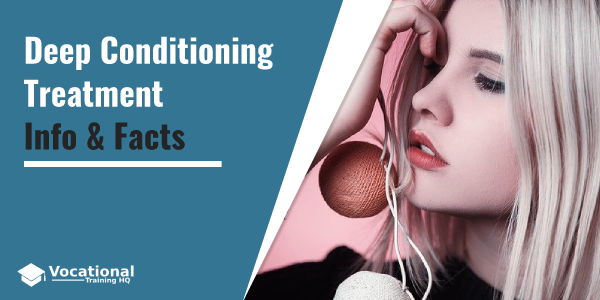Every day, our hair experience a whole bunch of harmful effects.
The list includes hair coloring, UV rays, heat from hairdryers and straighteners.
As a result, lots of people have dry, brittle, and damaged hair.
Any hairdresser can prove to you that women’s desire to be creative with their hair provides salons with a variety of services’ options.
The most popular one is the deep conditioning treatment.
The fact is that it is a perfect bet for anyone.
This type of treatment suits almost any type of hair so every salon adds this option in its services’ list.
Even the most damaged hair can be treated with deep conditioning treatments.
It is an ideal way to repair, moisturize, nourish and restore even very damaged hair in just one procedure.
Article Table of Contents
The Benefits of Deep Conditioning Treatments
Deep conditioning treatments are also known as masks that can be of two types.
The first one is protein-based treatments and the second one is moisture-based treatments:
- Protein-based deep conditioners aim to strengthen hair, improve elasticity, and prevent breakage;
- Moisturizing deep conditioners bring moisture back into hair;
You need to know that deep conditioning treatments have numerous great benefits.
First of all, it is a great way to make your hair shiny and lustrous.
Also, it is perfect for people who have dry scalp, flaking, and itching.
There is a bunch of deep conditioning treatments that are designed for colored or chemically treated hair.
Colored hair becomes dry and dull while special treatment can make it shiny and healthy.
Women who have frizzy, lifeless hair, use deep conditioning treatment to make it soft and shiny.
Applying Deep Conditioners
The most effective deep conditioning treatments are those that use heat.
The reason is that heat makes hair follicles swell and lead for better penetration of substances into the hair shaft.
Before applying the deep conditioning treatment, it is necessary to wash hair.
When applying the treatment, focus on the ends as they are the driest, broken and damaged.
If you are working with long hair, a wide-toothed comb will help you to apply the product more evenly.
After applying the treatment, use a plastic cap and invite your client to sit under a hood dryer for 20-30 minutes.
After the required time passed, hair should be rinsed well and can be styled.
Client Recommendations
The necessity to repeat the procedure and its frequency depends on your client’s hair type, condition, and care routine.
For example, women who have curly, colored, or chemically treated hair, can apply deep conditioning treatment each time they visit a salon.
When it comes to deeply damaged hair, it is better to repeat the procedure twice a week until the hair condition improves.
In some cases, clients especially need a deep conditioning treatment during colder, winter months or after some time at the beach.
Cold or very hot weather makes your hair dry while deep conditioning treatments aim to moisturize it.
There are also people who can apply deep conditioning treatments just a few times per year.
Conditioning Products and Ingredients
Salon-quality deep conditioning products usually contain such natural ingredients as mineral oils, shea butter, or soybean oil.
There also can be various advanced ingredients such as:
- Hydrolyzed keratin;
- Hydrolyzed oat protein;
- Hydrolyzed silk protein;
- Hydrolyzed soy protein;
- Hydrolyzed wheat protein.
The modern market offers a whole variety of deep conditioning treatment products.
Among the most known and popular, there are:
- Matrix Biolage Hydrasource Mask;
- Redken Extreme Strength Builder Plus Fortifying Hair Mask;
- Paul Mitchell Awapuhi Wild Ginger Keratin Intensive Treatment;
- Leonor Greyl Nourishing Treatment Mask;
- Wella Luxe Oil Keratin Restore Mask.
Special Considerations When Conditioning Curls
Wavy and curly hair requires deep conditioning treatment pretty often.
The reason is that this type of hair has more porous strands.
Depending on the type of hair, various products can be used:
- Wavy hair requires lightweight conditioning ingredients such as coconut oil as it doesn’t result in weighed down locks.
- Curly hair requires a deep conditioner with shea butter as it moisturizes while promoting the detangling process.
- Tight curls and kinky curls require shea butter or cetyl alcohol as they are rich emollients.
As soon as the procedure is finished, it is necessary to rinse hair with cool water to seal the naturally coarse hair shaft.
To learn more, click here to find a cosmetology school in your state >>>
